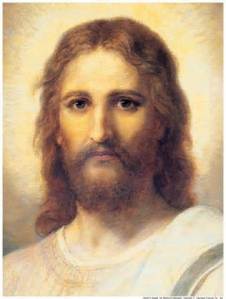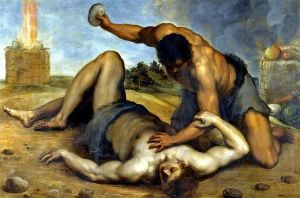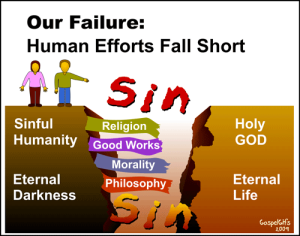In this day and age, it seems that the more vulgar a cartoon or program is, the more popular it becomes. With this being the case, a vulgar atheist cartoon is making its rounds online and on social media. One of the many growing offensive anti-religion sites is called “The Atheist Pig.” The comic is a vulgar, rancid display of the juvenile, invasive, ad hominem style that marks many atheist online communities. While the site claims to attack all religious beliefs, Christianity is clearly the primary target. One particular strip addressed God’s morality as a parent. The strip indicated that God was a bad parent since God killed His Son. However, does this accurately identify the New Testament’s teaching on the doctrine of atonement? This article will address the question, “Was God a bad parent for allowing His Son to be killed?” Four fundamental truths must be understood in order to answer this question.
Jesus Was God
Advocates of the “God is a Bad Parent” motif clearly do not understand Christian theology. Therefore, Christian theology should be clarified for the believer and adversary alike. Perhaps this view is stemmed from a misunderstanding of John 3:16 which states that “For God loved the world so much that he gave his one and only Son, so that everyone who believes in him will not perish but have eternal life” (John 3:16, NLT). Perhaps the skeptic thinks that God forcefully handed over His Son and negligently allowed Him to be killed. The view is flawed in that the advocate fails to understand that Jesus (the Son) is understood to be God. Yes, Jesus (the Son), Yahweh (the Father), and the Holy Spirit are three distinct personas, but they are part of the same Godhead. Jesus understood Himself to be divine. Jesus said, “The Father and I are one” (John 10:30). In fact, Jesus would get in trouble with the Jewish authorities over such claims. But not only did Jesus understand Himself to be God, the disciples understood the same thing about Jesus. John clarifies all doubt when he writes of Jesus, “In the beginning was the Word, and the Word was with God, and the Word was God” (John 1:1). Also, God Himself claimed Jesus as His Son as on several occasions a voice from heaven was heard saying “This is my dearly loved Son, who brings me great joy” (Matthew 3:17, NLT). So, the picture of God negligently handing over His Son is a misconception. It was God Himself that took on the sacrifice for the good of humanity.
Jesus Died Willingly…He was Not Forced
As previously noted, God Himself took on the problem of sin. In addition, it should be noted that God was not forced to cure the problem of sin (which will be addressed in the final section of this article). Jesus died willingly for the good of humanity. In fact Jesus said, “This is why the Father loves Me, because I am laying down My life so that I may take it up again. No one takes it from Me, but I lay it down on My own. I have the right to lay it down, and I have the right to take it up again. I have received this command from My Father” (John 10:17-18). Did the Father only love the Son because of the sacrifice? No. Remember, the Father and Son are one. Perhaps Jesus is talking about the work being done. It had the Father’s approval because God knew the end result. Nonetheless, for the purpose of this article, it should be remembered that Jesus gave Himself freely because of His love for humanity.
The Sacrifice Saved Humanity from Their Own Destruction
Along with the misconception of bad parenthood, Christian adversaries purport that God sent Himself to save humanity from Himself. However, this does not adequately present the full picture of the atonement. The sacrifice of Christ is better understood as God coming to save humanity from itself. When a person evaluates the growing depravity of our culture and the coinciding lack of faith by the populace, a clear parallel is found. Humans do not have a good track record when living according to their own whims and fancies. That is where humanism leads. However, when one understands the great virtues found in the sacrifice of Christ and His selflessness, one can appreciate how such virtues can transform societies for good. Societies are much better when individuals live selfless lives instead of selfish lives. Only Christianity can provide a clear view of such selflessness.
Holiness and Sin Are Irreconcilable and Must Be Dealt With Accordingly
Why was the sacrifice necessary? Could God not just look the other way? No, because of a logical inconsistency. Holiness and sin are just as opposed as light and darkness. Holiness is “in relation to God refers climactically to his moral perfection. His holiness is manifest in total righteousness and purity” (Williams 2001, EDOT, 562). Holiness knows no sin. In contrast, sin cannot be holy. One sin demerits holiness. No one can be holy as long as one has sin. Sin is the lack of moral perfection. Therefore, holiness and sin cannot coexist. So, how does God handle the sin problem? God has two options.
Holiness Can Destroy, or Isolate, Sin
Unatoned sin cannot stand before a holy God. This is why a place called hell exists. Hell was never intended for human beings. Jesus said that hell was “prepared for the Devil and his angels” (Matthew 25:41)! Thus, when a souls reject the atoning, loving work of Christ performed for them, only one alternative exists: the soul must be separated from God’s holiness; not for God’s protection, but because sin cannot coexist in God’s presence. But thankfully, another option exists.
Holiness Can Atone Sin
God can also atone sin. Because of God’s justice, God cannot simply pretend that the sin does not exist. However by the love of God, God can pay the penalty for the sin. That is essentially the definition of atonement. As L. L. Morris states, “Christ has taken our place, doing for us what we could not do for ourselves. Our part is simply to respond in repentance, faith, and selfless living” (Morris 2001, EDOT, 114). Faith is dependence upon God and the acceptance of the work done at the cross. Thus, a person’s sins are atoned and the person is able to live eternally in the presence of God with love, joy, peace, patience, goodness, kindness, and faithfulness.
Conclusion
Is God the Father a bad parent for allowing His Son to be sacrificed? Absolutely not! God knew the end result. God knew that His Son would be raised back to life. God knew the transformation that would come in the lives of many. God knew the hope that many would have. God knew the bliss and joy that would come from this sacrifice to countless individuals. God did not just send His Son to save us. When the person of Christ is understood, one will find that God Himself visited humanity and saved us from ourselves.
If you have not experienced the salvation offered through Christ, why not do so now? Repent of your sins and pray a prayer similar to this one:
“Lord Jesus, I know that I am a sinner and I do not deserve eternal life. But, I believe You died and rose from the grave to make me a new creation and to prepare me to dwell in your presence forever. Jesus, come into my life, take control of my life, forgive my sins and save me. I am now placing my trust in You alone for my salvation and I accept your free gift of eternal life.”
Bibliography
All Scripture, unless otherwise noted, comes from the Holman Christian Standard Bible. Nashville: Holman Bible Publishers, 2009.
Morris, L. L. “Atonement.” In Evangelical Dictionary of Theology, 2nd Edition. Edited by Walter A. Elwell. Grand Rapids: Baker Academic, 2001.
Scripture marked “NLT” comes from the New Living Translation. Carol Stream: Tyndale, 2007.
Williams, J. R. “Holiness.” In Evangelical Dictionary of Theology, 2nd Edition. Edited by Walter A. Elwell. Grand Rapids: Baker Academic, 2001.
Copyright. Pastor Brian Chilton. 2014.












God is truly a good and loving parent. I am encouraged and inspired to understand in depth the virtues and character of my Father God through this insight by Pastor Brian.
Thank you Ben. I agree. God is a wonderful parent who loves us with an everlasting love. Blessings.
God is truly a good and loving parent. I am encouraged and inspired to understand in depth the virtues and character of my Father God through this insight by Pastor Brian.
Thank you Ben. I agree. God is a wonderful parent who loves us with an everlasting love. Blessings.